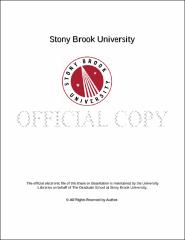| dc.identifier.uri | http://hdl.handle.net/11401/76916 | |
| dc.description.sponsorship | This work is sponsored by the Stony Brook University Graduate School in compliance with the requirements for completion of degree. | en_US |
| dc.format | Monograph | |
| dc.format.medium | Electronic Resource | en_US |
| dc.language.iso | en_US | |
| dc.publisher | The Graduate School, Stony Brook University: Stony Brook, NY. | |
| dc.type | Thesis | |
| dcterms.abstract | It has been known for over 60 years that tumor metabolism is strikingly different than normal tissue metabolism. In this thesis, I review literature pertinent to cancer metabolism and how the altered regulation of metabolism helps tumors to meet their metabolic needs. Otto Warburg's pioneering studies on tumors first demonstrated that tumors rely on glycolysis even in the presence of oxygen. Warburg proposed that the high glycolytic rate in tumors was due to cancer cells' inability to perform mitochondrial oxidative phosphorylation (OXPHOS). Recent investigations do not support the idea of dysfunctional OXPHOS in cancer cells A new understanding of Warburs'g original observations has emerged recently. The new working model has been termed two-compartment metabolism. This model underlines the extensive observed cooperation between non-transformed supporting stromal tumor cells and malignant cells within tumors. Evidence indicates that cancer cells condition stromal cells to secrete important metabolites (such as lactate) as byproducts of elevated glycolysis. Cancer cells import lactate and convert it to pyruvate, which enters the mitochondrion and drives OXPHOS. This not only supplies ATP to cancer cells but provides crucial biosynthetic precursors for the synthesis of nucleotides, amino acids and lipids. Cancer cells dysregulate the uptake of glucose and the regulatory enzymes in glucose metabolism as well. Some of the main enzymes include hexokinase, pyruvate kinase, lactate dehydrogenase, pyruvate dehydrogenase, and pyruvate kinase. Some of the changes in reconfigured cancer metabolism are due to the expression of specific isozymes of regulatory enzymes, others are due to changes in levels of expression. . The expression of particular isozymes presents the opportunity to create chemotherapeutics with higher specificity than currently available treatment regimens and hopefully better outcomes for patients. In the emerging field of therapies designed to target the aberrant tumor metabolisms some have shown promising potential. | |
| dcterms.available | 2017-09-20T16:51:26Z | |
| dcterms.contributor | Zachar, Zuzana | en_US |
| dcterms.contributor | Kiely, Joan | en_US |
| dcterms.creator | Guardado, Moises Ovidio | |
| dcterms.dateAccepted | 2017-09-20T16:51:26Z | |
| dcterms.dateSubmitted | 2017-09-20T16:51:26Z | |
| dcterms.description | Department of Biochemistry and Cell Biology. | en_US |
| dcterms.extent | 27 pg. | en_US |
| dcterms.format | Monograph | |
| dcterms.format | Application/PDF | en_US |
| dcterms.identifier | http://hdl.handle.net/11401/76916 | |
| dcterms.issued | 2015-08-01 | |
| dcterms.language | en_US | |
| dcterms.provenance | Made available in DSpace on 2017-09-20T16:51:26Z (GMT). No. of bitstreams: 1
Guardado_grad.sunysb_0771M_11974.pdf: 820617 bytes, checksum: 797ea8943da43b99746e2776cf481499 (MD5)
Previous issue date: 2014 | en |
| dcterms.publisher | The Graduate School, Stony Brook University: Stony Brook, NY. | |
| dcterms.subject | Cellular biology | |
| dcterms.subject | Cancer, Dysregulation, Metabolism | |
| dcterms.title | Review of Glucose Metabolism Dysregulation in Cancer | |
| dcterms.type | Thesis | |

